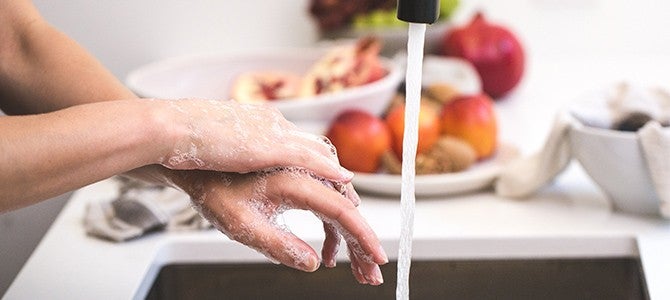Protecting Your Community with Personal Hygiene
April 16, 2020

Even with local programs and community health protocols, we are all at risk of catching a mild cold or the flu. In more dangerous situations is the risk of catching an infectious disease due to the lack of personal hygiene. While the government regulates the cleanliness of a restaurant, they do not impose the same restrictions on individual households. It may seem obvious to most, but neglecting to follow personal hygiene practices can result in negative consequences in your social life, work life, and most importantly your health.
Poor Hygiene
Improper cleanliness may seem like an underlying “personal problem” for the individual who lacks proper hygiene habits. Unfortunately, those unwilling to practice personal cleanliness can actually have a major impact on the community. In 2009, Cambridge University published a study regarding the bacteria on commuter’s hands after using public transportation. They found that those who reported having washed their hands that morning compared to those who did not wash their hands had very little difference in contamination. It is easy to see that personal hygiene only works if everyone is participating in cleanliness practices.
Hygiene and Immune Health
Luckily, our bodies do a pretty good job of fighting off bad bacteria and can help prevent us from getting sick frequently. Our immune system is at the front lines everyday protecting us from harmful pathogens like parasites and viruses. As our immune system encounters specific pathogens it remembers how to fight them off in case they return to your system. By the time we are adults we have a substantial archive of pre-established attacks we can perform when these common viruses and bacteria enter our bodies.
We can help boost our immune system by implementing best hygiene practices, limiting the number of bacteria and other harmful contaminants that can enter the body. Harvard Medical School suggests following these tips to help boost your immune system.
- Hand washing with soap and water before preparing food and after using the bathroom.
- Cover your mouth and nose with a tissue when you sneeze or cough. Or cough into your elbow rather than your hand.
- Do not pick at healing wounds or blemishes or squeeze pimples. Doing so allows germs to enter.
Practicing good hygiene can also prevent germs from spreading to others and contribute to a healthy community.

Spreading Germs
Germs spread through various ways that all route back to a lack of personal hygiene. Even for those who diligently wash their hands after using the restroom or handling food can play a role in the spread of disease-filled germs and bacteria. Simply touching a railing or door handle in public exposes you to a variety of germs.Let’s say a single person sneezes into their hand and then opens a door. The next person to touch that doorknob will be contaminated. That person can then go on to touch several other items before washing their hands, continuing the spread of the germs from the person who sneezed. Since germs can move around so easily it is recommended to wash your hands frequently and use hand sanitizer when washing your hands when soap is not available.
Hand Washing
The Center of Disease Control and Prevention (CDC) says “Keeping hands clean is one of the most important steps we can take to avoid getting sick and spreading germs to others. Many diseases and conditions are spread by not washing hands with soap and clean, running water.” The CDC offers strict guidelines on how to wash your hands.
- Wet your hands with clean, running water (warm or cold), turn off the tap, and apply soap. Lather your hands by rubbing them together with the soap.
- Lather the backs of your hands, between your fingers, and under your nails.
- Scrub your hands for at least 20 seconds. Need a timer? Hum the “Happy Birthday” song from beginning to end twice.
- Rinse your hands well under clean, running water.
- Dry your hands using a clean towel or air dry them.
Visit the CDC web page for more educational material around hand washing.

Hygiene in the Home
Hand washing with soap could protect about 1 out of every 3 young children who get sick with diarrhea and almost 1 out of 5 young children with respiratory infections like pneumonia. Proper hygienic care starts with teaching young children how to thoroughly wash their hands.
Adults and parental figures play a momentous role in the healthy habits a child creates. Start by being an example of washing your hands with soap and water for 20 seconds. Give your child frequent reminders to wash their hands after using the restroom, playing outside, before eating, etc. If soap and water are not accessible, use hand sanitizer with at least 60% alcohol content. Keep small bottles of hand sanitizer in your bag and your car. After visiting the grocery store is even a good time to kill some of those pesky germs.
Remember to lead by example and teach your family how to protect themselves and others from harmful, infectious diseases and viruses. In order for a healthy community to thrive we all need to do our part in practicing good personal hygiene.
-
Pollution is a hot topic that is increasingly becoming a global concern. In 2019, the World Health Organization considered air pollution the “greatest environmental risk to human health”.1 Air pollution contributes to 7 million premature deaths each year and numerous other health complications related to the respiratory and circulatory systems. Where does all this pollution come from and how can w...
-
After a holiday season full of excessive shopping, Netflix binging and overindulging in desserts, January comes around and everyone seems to be newly committed to their goals. The new year brings a focus on health, relationships, finances and more. You might have even pledged to keep a resolution or two yourself.

